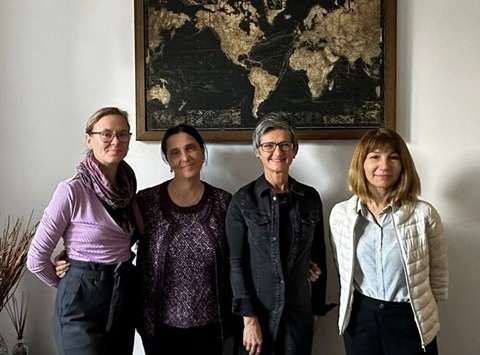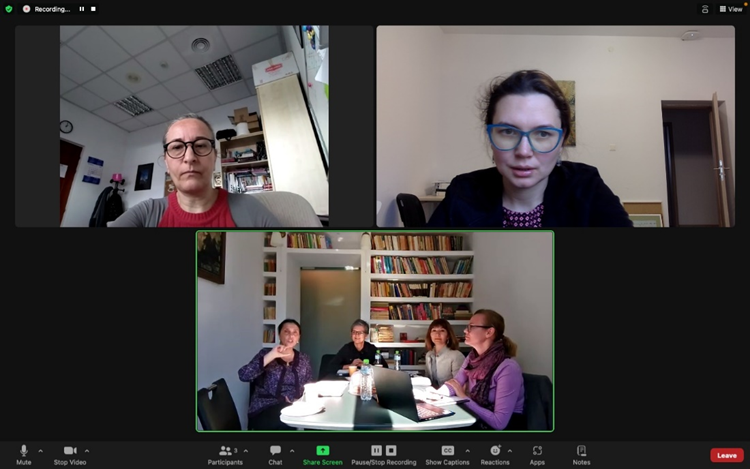SOLIDarity EXperiences (SOLIDEX) through the Eyes of Children
- Fulbright Alumni Collaboration -
By Bruce Adams, Contributing Writer

From left to right SOLIDEX team members: Elena Ungureanu, Luisa-Maria Rosu, Catalina Ulrich Hygum, Madalina Coza.
February 14, 2024
What do children aged 11-13 in two countries think about solidarity? The SOLIDEX project is a research initiative funded through the Fulbright Romania examining how children in Romania and the United States understand the evolving contexts of solidarity.
Building upon their Fulbright experiences, at the University of Illinois Urbana-Champaign and the University of Bucharest, respectively, Catalina Ulrich Hygum and Luisa-Maria Rosu, were granted, in May 2023, a Fulbright Alumni Institutional Development Grant with a team including Dr. Leyla Safta-Zecheria from the West University of Timisoara, Dr. Marcela Slusarciuc (also a Fulbright scholar) from the University of Suceava Stefan cel Mare, Dr. Elena Ungureanu, and Madalina Coza, PhD student from the University of Bucharest.
Ulrich Hygum’s work belongs to the Sociology of Education, while Rosu is a Mathematics major and a STEM programs’ evaluator. What brought them and a consortium of four different institutional perspectives together is the way they think about how participative methods of teaching and doing research inform active citizenship. They collaborated on several papers over the last 15 years and co-advised students. They found common interests, proving once more that STEM and Humanities are not parts of a dichotomy but address common issues of our civic responsibilities.
“Our investigation initially stemmed from children’s reactions to news surrounding war, conflicts, and crises, prompting a deepened interest in their diverse interpretations of solidarity within such contexts—those influenced by war, migration, pandemics, natural disasters, climate change, and more—in various regions of Romania and the U.S.” Ulrich Hygum said. “Our focus was to understand how children aged 11 to 13 perceive and comprehend the events unfolding around them and how they understand and experience solidarity. Our primary aim is to advocate for qualitative research methods and highlight the complementarity /synergy among methodological resources in educational research. We emphasize participatory methods, aligning with the principles of doing research with children as competent social actors.”
“I loved the project's focus because STEM citizenship is a goal of the I-STEM Education Initiative. I-STEM not only evaluates and promotes high-quality educational initiatives informed by cutting-edge research in STEM topics but also illustrates the contextual power of those initiatives: how people perceive those STEM concepts and how they understand how to use them in their lives. Looking back at all the challenges we faced in the last years: COVID-19 vaccines, adapting healthcare systems to new medical technologies, understanding voting system, and watching how young generations witness and process these challenging situations, STEM Education, more than ever, implies and requires active citizenship.”
The research team is organizing out of school four different workshops with groups of approximately 15 middle-school students across eight schools totaling 120 students in Romania and the U.S. Safta-Zecheria noted that “we hope to understand both how age-specific dynamics work in relation to solidarity, but also to work as a group and how these diverse backgrounds and socio-cultural contexts shape the ways in which children understand solidarity.” That diversity includes rural and urban populations, economic status, ethnic groups, and schools with Ukrainian refugees.
“When Cătălina proposed this collaboration,” Rosu recalled, “I realized we had two foci. First, we were interested in audiovisual data which has a more prominent place in research nowadays with the vividness of films and the ubiquity of new technology in young people’s lives. The second was the different perceptions and ways of children today to see the same topics and issues in our society from what we've seen with our own generations. We realized that it would be a realistic start for a potential interinstitutional partnership to begin with a pilot study about how children see the world, how they help each other, and how they respond to help society. We are very thankful to have the support of Fulbright funding and build on our previous collaboration.”

October 2023 SOLIDEX team working meeting: Above - Madalina Slusarciuc and Leyla Safta-Zacharia.
Ulrich Hygum emphasized that “the facilitation process involves diverse methods, including photo-voice, photo elicitation, observation, drawings, collages, storytelling, theater activities, individual and group interviews, interpretation, and re-writing of AI narratives, among others. Through mediums like drawings, photos, collages, theater, and more, children will engage in reflective activities addressing pertinent social issues such as self-identity, diversity, isolation, exclusion, the future, and environmental concerns. These methods offer them an avenue to express their thoughts and feelings about these critical subjects.”
Safta-Zecheria observed that “as university professors, most of us felt comfortable working with students as teachers. Working with children and young people as research facilitators is a very different process that requires a lens shift that is not always easy to digest for the adult university-based researcher.”
“Giving participants ownership over their participation can sometimes lead the interaction away from the topics that are of interest to researchers, in our case, from discussing solidarity.” She continued. “This can be frustrating, but it is part of a process of equalizing power relations in the research process between adult researchers and child participants. This relationship should ideally bring away from the teacher-student relationship into one of distributed leadership of the investigative process.”
“The evaluation data we gather during our meeting in Bucharest in April, where we'll convene a diverse group of stakeholders, including teachers, district and school administrators, and developers of curriculum and instructional methods, will provide us with initial insights into our next steps.” Rosu added. “We hope to establish a robust, long-term interinstitutional partnership with a diverse research community across various research fields, united by our common goal of fostering active engagement among future generations in learning how to empathize with and respond to challenging situations faced by others.”













.jpg)
















